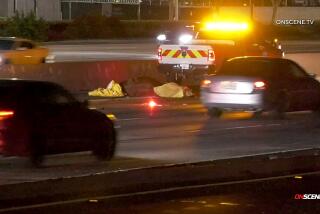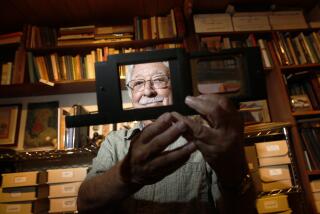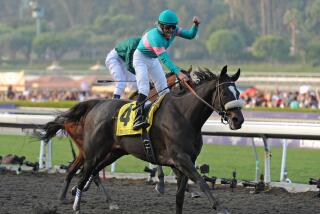Liz Blackwelder dies at 93; rode in Bicentennial Wagon Train
Liz Blackwelder saddled her horse in Pomona, put on her wide-brimmed hat and started riding east across the United States. She hit winter weather in Arizona and northern New Mexico, trudging on through snow and temperatures so low that icicles formed on the nose of her horse, Chungo. As the miles and months passed, she faced dust storms, rain and heat, sometimes depending on the kindness of strangers for a hot meal.
Finally, six months later, she rode into Valley Forge, Pa., a distance of about 2,500 miles.
This is not a story about a pioneer woman. It took place in 1976, and Blackwelder was an insurance agent in La Cañada Flintridge. She made the epic ride with a group — only about half of which made it the whole way — in honor of the nation’s bicentennial.
“She was a tough woman,” said her son Steven.
Blackwelder, 93, died Jan. 15 at home of natural causes, her son said.
The ride was not just a one-off. Blackwelder loved horses all her life and was a fierce advocate for the establishment of trails and equestrian facilities in the La Cañada Flintridge area.
To commemorate her efforts, a portion of a trail in the city’s Cherry Canyon is named Liz’s Loop. Last year, Blackwelder was present for the dedication of a rest area in the canyon for riders and horses — a project she got off the ground by donating $35,000.
“Take care of it,” she told riders and city officials at the ceremony in July. “It’s up to you, the public, to make it a success.”
Elizabeth June Gerrard was born June 17, 1920, in Evanston, Ill., and grew up in Atherton, Calif.
She was first placed on a horse at the age of 3. “The story is that the horse took off, but she held on,” her son said. “She loved it.”
Blackwelder studied biology at Stanford University and during World War II was a member of the WAVES division of the Navy, assigned to the Naval Medical Research Institute, where she worked on the development of emergency life raft rations, among other projects. After the war, she returned to college at UCLA, earning a bachelor’s degree in zoology.
In 1950 she married Spencer Blackwelder, a real estate broker. She managed the insurance arm of his business.
And she kept up her interest in horses. In the 1970s, Blackwelder entered several 50-mile endurance races with Chungo, and in 1975 they completed a 100-mile race.
Then on Jan. 2, 1976, came the start of the Southern California contingent of the Bicentennial Wagon Train to Pennsylvania. The goal was to duplicate, as much as possible, rides by pioneers who settled the West.
Blackwelder readily admitted that the modern-day riders didn’t rough it nearly as much as the pioneers.
Among the biggest differences, she and others slept nightly in modern trailers that followed the riders. “We had to,” she said in a 1976 Los Angeles Times interview. “We’d either have become basket cases or would have had to admit the old pioneers really had it, and we didn’t.”
On July 3, she rode into Valley Forge, where other wagon trains from different parts of the country converged for an event attended by then-President Gerald Ford. Blackwelder and Chungo then returned to California, traveling this time by jet.
Back home, she continued her advocacy for horse trails and for controlled growth of La Cañada Flintridge. In 1990 she ran for City Council, opposing plans for a shopping center proposed by the town’s biggest merchant, Sport Chalet, but lost after a bitter campaign.
She continued riding into her 80s but had stopped by the time her Cherry Park project was finally approved. “My horses have died, and too many of my friends have died too,” she told the La Cañada Valley Sun in 2012. “But that happens, that’s life.”
Her husband died in 1996. She is survived by her sons Steven of Dana Point, Robert of La Cañada Flintridge and Clyde of San Juan Capistrano; daughter Lenora of Glendale; and two grandchildren.
More to Read
Start your day right
Sign up for Essential California for the L.A. Times biggest news, features and recommendations in your inbox six days a week.
You may occasionally receive promotional content from the Los Angeles Times.







